Farmer Mental Health
From crises to healing

Farm Bureau News
JANUARY 2023
The Voice of Virginia’s Agricultural Producers
9 HISTORIC FUNDING TOUTED AT CONVENTION
Farmers attending the VFBF Annual Convention were encouraged to take advantage of the $295 million the General Assembly allocated for conservation practices 13
AG PODCASTS ARE PORTABLE ENTERTAINMENT
From the tractor cab to the recliner, farm podcasts offer education and entertainment for farmers while they ’re working or relaxing. 15
FARM STRESS CAN LEAD TO CRISES
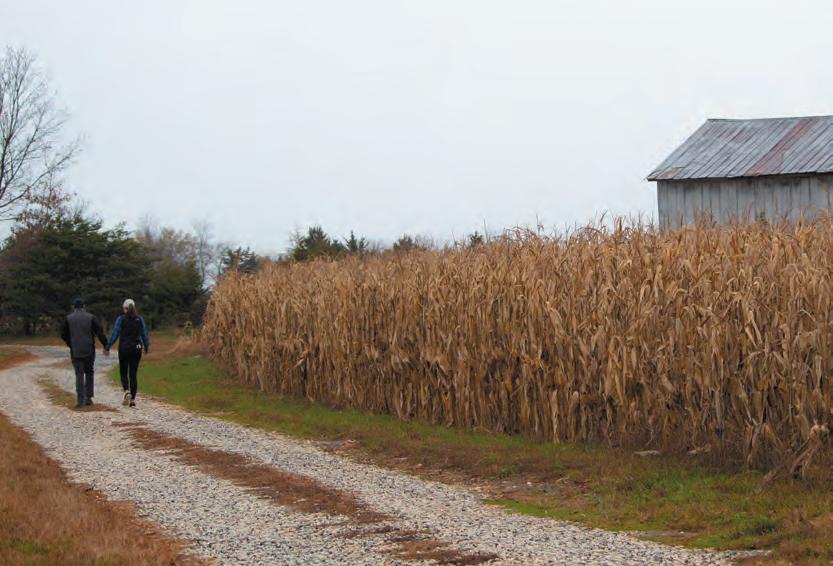
Farmers contend with constant stress that can lead to mental health struggles, but a new state resource is available to help. 18
PLANT DISEASES ARE PRODUCERS’ NEMESES
New and emerging diseases like corn tar spot and plectosporium blight can wreak havoc on crops, so plant pathologists are closely monitoring them.
“It was a slow-motion trainwreck.”
— JOHN DOE, a farmer who found support during a mental health crisis
Volume 82, Number 1 January 2023
Virginia Farm Bureau News (USPS 017763) (ISSN 1525-528X) is published four times a year. January, April, September, November. It is published by Virginia Farm Bureau Federation, 12580 West Creek Parkway, Richmond, VA 23238. Periodicals postage rate is paid at Richmond, VA and additional mailing offices. The annual Subscription Rate is $1.13 (included in membership dues).
Postmaster: Please send changes of address to, Virginia Farm Bureau Federation, Farm Bureau News, P.O. Box 27552, Richmond, VA 23261-7552; fax 804-290-1096. Editorial and business offices are located at 12580 West Creek Parkway, Richmond, VA 23238. Telephone 804-290-1000, fax 804-290-1096.
Email virginiafarmbureaunews@vafb.com. Office hours are 8 a.m. to 4:30 p.m., Monday through Friday.
Members — Address change? If your address or phone number has changed, or is about to change, contact your county Farm Bureau. They will update your membership and subscription information.
All advertising is accepted subject to the publisher’s approval. Advertisers must assume liability for the content of their advertising. The publisher assumes no liability for products or services advertised. The publisher maintains the right to cancel advertising for nonpayment or reader complaints about services or products.
Member: Virginia Press Association
EDITORIAL TEAM
Pam Wiley Vice President, Communications
Kathy Dixon Managing Editor
Nicole Zema Staff Writer/Photographer
Adam Culler Staff Writer/Photographer
Maria La Lima Graphic Designer
PUBLICATION SCHEDULE
Producer members will receive their next issue of Virginia Farm Bureau News in April. The magazine is published quarterly, and back issues can be viewed at issuu.com/ virginiafarmbureau.
WE’RE SOCIAL!
Eleanor Stickley Graphic Designer
Alice Kemp Staff Writer/Advertising Coordinator
VIRGINIA FARM BUREAU FEDERATION
Officers
Wayne F. Pryor, President
Scott E. Sink, Vice President
Board of Directors
DIRECTOR DISTRICT COUNTY
Emily F. Edmondson 1 Tazewell
Richard L. Sutherland 2 Grayson
Bruce N. Stanger 3 Montgomery
Jeannie L. Dudding 4 Craig
Russell L. Williams II 5 Rockbridge
Justin Pence 6 Shenandoah
Thomas E. Graves 7 Orange
Leigh H. Pemberton 8 Hanover
William F. Osl Jr. 9 Cumberland
Robert J. Mills Jr. 10 Pittsylvania
J. M. Jenkins Jr. 11 Lunenburg
J. Barry Bates 12 Essex
M. L. Everett Jr. 13 Southampton
David L. Hickman 14 Accomack
THE COVER
A. Faye Hundley * Essex Michelle Fox ** Tazewell
*Women’s Leadership Committee Chair
**Young Farmers Committee Chair
2 VIRGINIA FARM BUREAU NEWS
Departments 6 For Your Benefit 8 Save the Date 28 Heart of the Home
Features ON
intensify
Farm Bureau News
Farm stress can
mental health difficulties (Photo by Nicole Zema).
15
With 2022 in the rearview mirror, VFBF looking ahead to 2023
WAYNE F. PRYOR
We have a habit of looking back and assessing our successes, but to kick off 2023, I’d like to explore what’s ahead.
The 2023 Farm Bill will be the 19th farm bill since the 1930s, and for nearly a century this federal legislation has been crucial for farmers in Virginia, and across the country. The bill underpins farm program payments, food policy, conservation initiatives, rural development, foreign marketing and more.
The farm bill combines agricultural, conservation and nutrition policies and initiatives and goes beyond farm programs, involving a broader group of rural and urban stakeholders. This farm bill will determine if current program funding continues, and could maintain a balance of both farm and nutrition programs.
We are joining with the American Farm Bureau Federation in prioritizing risk management tools within the 2023 Farm Bill, including crop insurance and commodity programs. Additionally, we are lobbying for adequate U.S. Department of Agriculture staffing and resources to provide technical assistance to our farmers for conservation efforts.
Since the 2018 Farm Bill was enacted, farmers have faced significant challenges from increased input costs, market volatility and natural disasters. The farm bill has helped reduce food insecurity, bolstered national security and encouraged long-term stability for farm families.
Our farmers need that stability, especially in lieu of the skyrocketing input costs they faced this past year. The good news is that futures pricing is optimistic right now. Prices for corn
and soybeans remain high, so if you take the opportunity to lock in prices for the upcoming growing season, this could provide you with some security.
A number of upcoming conferences and meetings will offer farmers information that also can help them succeed.
The annual Governor’s Conference on Agricultural Trade in March gives farmers a global perspective on marketing their products. The Young Farmers Winter Expo in February and Summer Expo in late July help young farmers network and learn about emerging industry trends.
The Women’s Leadership Conference in March this year will offer our farm women a chance to expand their leadership skills through workshops and networking.
The Virginia Ag Expo will be held in August in Virginia Beach and is the largest agricultural field day in the state. It provides farmers with information about the latest in equipment and technology.
Our Farm Bureau advisory committees meet throughout the year and are the true grassroots of agricultural advocacy. Volunteer members meet annually to identify commodity-specific issues and recommend new policies or amend existing ones to help best address concerns of farmers statewide.
I don’t want to discount 2022, because it was a successful year as you will read in the upcoming pages of this magazine. However, there’s no better time to look optimistically toward the future of Virginia agriculture and all the ways we can succeed together.
Wayne F. Pryor, a Goochland County hay and grain producer, is president of Virginia Farm Bureau Federation.

Top membership counties for end of membership year 2022
as of Oct. 31, 2022
County Farm Bureau Members
Washington 3,215
Bedford 3,204
Charles City-James City- 3,141 New Kent-York
Hanover 2,949
Tazewell 2,859 Augusta 2,604 Franklin 2,573 Henrico 2,560 Russell 2,502 Rockingham 2,472
County Farm Bureau Percentage of goal
Essex 107.93 Warren 106.48 King William 104.59
Fluvanna 104.08 Bedford 103.99 Goochland 103.99 Carroll 103.55 Russell 103.52 Louisa 103.45 Fauquier 103.27
County Farm Bureau Member retention rate
Clarke 95.70% Louisa 95.41% Nottoway 94.94% Southampton 94.80% Charlotte 94.78%
Lunenburg 94.76% Amherst 94.60% Rockbridge 94.46% Gloucester-Mathews 94.45% Accomack 94.26%
vafb.com / JANUARY 2023 3
President’s Message
2022 Success Stories
Member Support
Agriculture, Development and Innovation
• The Virginia Foundation for Agriculture, Innovation and Rural Sustainability helped producers and rural businesses apply for more than $24 million in grants and other initiatives. It also debuted a new website and logo.
• VA FAIRS also launched the inaugural VA FAIRS Agriculture and Forestry “Bull Pen” Innovation Challenge to inspire and reward entrepreneurial innovation. Finalists competed at the VFBF Annual Convention in late November.
• The grain marketing division assisted more than 400 grain producers with marketing their grain in 2022. It also successfully hosted the Mid-Atlantic Wheat Tour to connect wheat growers with buyers.

Communications
• News outreach efforts over the past 12 months resulted in more than 1,000 print articles and TV and radio news stories. Outreach efforts include a weekly news bulletin shared with media contacts statewide.
• In August 2022, the organization’s combined video channels on YouTube, including those of Real Virginia, the State Fair of Virginia and The Meadow Event Park, reached 5 million views. Of particular interest are the gardening tips and seasonal recipes from Real Virginia. We’re delighted to be a ready source for the 22,000 people who turned to us when they needed a recipe for tomato pie.
• Real Virginia marked 20 years in production in 2022. Flagship publication Virginia Farm Bureau News marked the 81st anniversary of its founding last winter, and associate member publication Cultivate magazine turned 14 last summer.
Governmental Relations
• VFBF policy prevailed on 50 out of 60 key policy issues, including full funding of the Agricultural Best Management Practice Cost-Share Program for the first time. The budget included $295 million for farmers to partner with the state in installing conservation practices over the next two years. Farm Bureau has been working on this since 2009.
• Virginia Cooperative Extension received $1.55 million for Extension agent retention and some additional positions. Extension also was directed to develop and maintain a map of prime farmland located Virginia. This will be used
by entities like the Department of Environmental Quality, which has been tasked with developing ways to reduce the impact of new solar facilities on prime farmland.
• Legislation was passed directing the Virginia Department of Agriculture and Consumer Services to develop a 5-year strategic plan for increasing meat processing capacity in Virginia. Farm Bureau hosted four regional listening sessions to give producers and processors an opportunity to provide input on development of the plan.
Growth & Service
• Membership quota was reached and exceeded. End-ofyear total was 133,163—867 more than in 2021. Member retention was 92.32%, and 64 of 88 county Farm Bureaus reached quota.
• New member benefits were added this year, including My Free Pharmacy, which offers discounted generic prescriptions via mail order, and Vogue Towers, which will pay members for leasing their land if used for locating a new cell phone tower.
• The Products Division increased sales and service by 30% thanks to new hybrid field district directors who also are serving as sales representatives for the division.
Special Programs
Agriculture Education
• A record-breaking $430,000 was raised for Virginia Agriculture in the Classroom in 2022.
• AITC celebrated 30 years of connecting children with agriculture.
• Throughout the annual Virginia Agriculture Literacy Week in March, more than 1,000 volunteers read to around 60,000 students across the commonwealth.
4 VIRGINIA FARM BUREAU NEWS 4 VIRGINIA FARM BUREAU NEWS
Clockwise from top left, 2022 highlights included roundtables with urban legislators at both the Women’s Leadership Conference and the Young Farmers Summer Expo; volunteers read agriculture-themed books to elementary students during Agriculture Literacy Week; and the State Fair of Virginia saw over 160,000 guests.
Women
• Hundreds of women attended the 2022 Women’s Leadership Conference in August, where county Farm Bureau women’s committees donated $17,256 to Virginia Agriculture in the Classroom and silent and live auctions raised a combined $6,802 for AITC.

• Women’s Program participants raised more than $60,000 to benefit AITC through the John Deere Gator Raffle.
• More than a dozen women attended the Women’s Leadership Academy Training, which was held the day before the Women’s Leadership Conference for a second year.
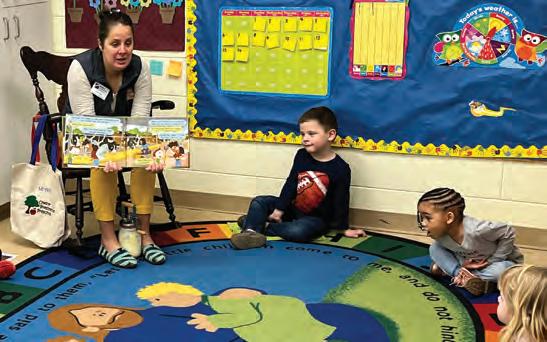
Young Farmers
• About 120 young farmers attended the 2022 Young Farmers Winter Expo in February, and over 220 young farmers attended the 2022 Young Farmers Summer Expo in July.
• A Lunenburg County Farm Bureau member, Matt Fimon of Brunswick County, was appointed to serve on the American Farm Bureau Federation Young Farmers & Ranchers Committee.
• Young Farmers have formed a new marketing subcommittee to work with the Agriculture, Development and Innovation Department to grow marketing opportunities for younger farmers.
Safety
• Virginia Farm Bureau Federation’s Farm Safety Advisory Committee has been promoting the Virginia Department of Agriculture and Consumer Services’ newly launched AgriStress Helpline to provide farmers with 24/7 mental health support. VFBF created 15 billboards to promote the helpline and is providing workshops to help people who interface with farmers to recognize signs of mental health distress.
• Work continues on the Thank-A-Farmer program that strives to demonstrate the public’s support for farmers. For a second year, visitors to the State Fair of Virginia were invited to write notes or draw pictures indicating their support.
• County Farm Bureaus are buying grain bin rescue tubes and donating them to local fire and rescue squads in rural areas where grain bin accidents may occur.
The Meadow Event Park
• Despite Hurricane Ian landing on the State Fair of Virginia’s final weekend, the fair saw 160,000 guests and operated with minimal issues.

• The annual youth livestock Sale of Champions, Black Tie and Boots and chainsaw carving auction fundraisers collectively raised $115,000 to help fund fair scholarships.
• The facility’s events continued to grow with record numbers of event days and the news that The Meadow will host another national event—the 50th annual BMW Owner’s Rally in June 2023.
vafb.com / JANUARY 2023 5
year-end roundup VFBF 2022
Thank you for your membership!
As a Farm Bureau member, you’ve put your support squarely behind your community and the farm families who produce the nation’s food and other important products. Here is the current package of member benefits and services.
Your Membership Advantage
Staff at your county Farm Bureau office are happy to provide details about any of these!
Travel Services
• Avis Car Rental Savings — up to 35% off Avis base rates
• Budget Car Rental Savings — up to 35% off Budget base rates
• Budget Truck Rental Savings — up to 20% off Budget consumer rental rates
• Biltmore Estate — up to $13 off regular gate admission and reduced rates at The Inn on Biltmore Estate and other accommodations
• Choice Hotel Discounts — 20% off the “best available rates” at Ascend, Cambria, Clarion, Clarion Pointe, Comfort, Country Inn & Suites, Econo Lodge, Everhome Suites, MainStay Suites, Quality Inn, Raddisson and Raddison Blu, Roadway Inn, Sleep Inn, Suburban Studio, and WoodSpring Suites locations
• Dollywood & Dollywood Splash Country — Save up to $10 on tickets to world-renowned theme parks in Pigeon Forge, Tennessee.
• Wyndham Hotels and Resorts Discounts — up to 20% off at over 8,000 AmericaInn, Baymont, Days Inn, Dazzler, Dolce Hotels & Resorts, Esplendor, Hawthorn, Howard Johnson, LaQuinta, Microtel, Ramada, Registry Collection, Super 8, TradeMark Collection, Travelodge, TRYP, Wingate, Wyndham, Wyndham Alltra, Wyndham Garden and Wyndham Grand locations.
Home/Business/Farm
• Bush Hog Products — Save up to $250 when purchasing Bush Hog products valued at $5,000 or more.
• Case IH Equipment Discounts — Save up to $500 on qualifying products from participating dealers.
• Caterpillar Machine Discounts — Save up to $2,750 on qualifying new Cat machines from participating dealers, and receive an additional $250 credit on work tool attachments purchased with new Cat equipment.
• Ford Truck Savings — $500 toward the purchase or lease of a new Ford Maverick, Ranger, F-150 or Super Duty®*
• Grainger Savings — Get deep discounts on equipment and supplies from Grainger, plus get free standard ground
shipping on all standard Grainger products**
• John Deere Rewards Savings — on residential, commercial and utility equipment
• Member Deals Plus®*** — lets you save wherever you go, with the nation’s largest private discount network on meals, clothing, vehicle care and other goods and services, with online access and show-your-phone technology.
• Farm Bureau Products Warehouse — competitively priced auto, truck and farm tires, and farm equipment parts
• Reward Protection Service — offers a $2,500 reward for information that results in a conviction in the event of theft or vandalism on a member’s property
• Vogue Towers — Members can get paid for leasing land to Vogue Towers for installing a wireless communication tower.
• Yamaha Vehicles — Get a $250 rebate on select Yamaha 4WD ATV and SXS vehicles, excluding youth models under 350cc.
Healthy Living
• Life Line Screenings — for stroke, heart attack and bone fracture risks
• My Free Pharmacy — members eligible to receive free generic prescriptions delivered to their door with a paid subscription
Insurance Protection
New product offerings give members more options than ever before. Fast claims service when you need it most and personal, face-to-face service.
• Auto, Home, Life — a wide array of auto, home, and life insurance products, as well as farm, business liability and personal property insurance
• Health — Staff at your county Farm Bureau office can help you review and enroll in individual, group or Medicare supplemental health insurance plans with health insurance carriers on both the public and private health insurance marketplaces.
6 VIRGINIA FARM BUREAU NEWS
members. Vogue’s management team has built more than 5,000 towers in the U.S. since 1996. Cell towers allow wireless networks to better serve the communities in which they’re located, improving cell phone reception, and ensuring the highest level of safety.

Members who are interested in leasing land for a tower should register their information with Vogue Towers through our website, vafb.com/membership-at-work/benefits/ Vogue-Towers. Registration is not a commitment to lease your property, but simply an expression of interest in the program. After you submit an opt-in form on that page, Vogue Towers will contact you directly when they are seeking space for towers in your area.
If a tower is built on a member’s property, that member will be paid a one-time fee and then receive a monthly rent with annual escalation. The initial lease is for a 5-year term with seven 5-year renewals.
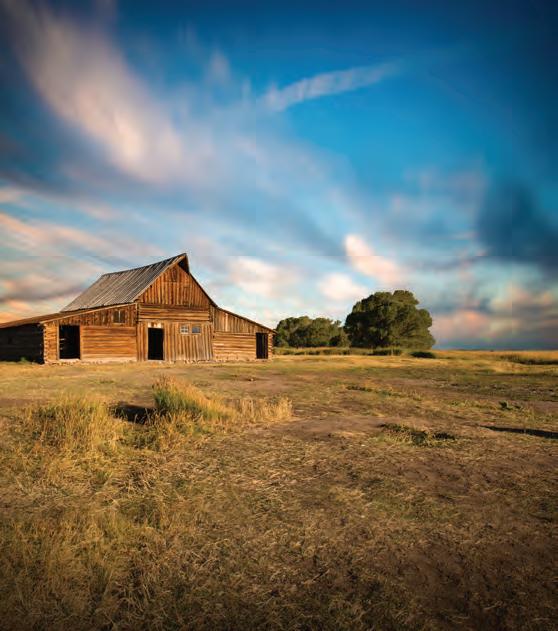
The leased area will be 55' x 55' up to 75' x 75', and the height will be determined by the phone carrier. All towers will have a secure, fenced compound. Vogue maintains insurance on the tower and takes care of all ground maintenance.



vafb.com / JANUARY 2023 7
• Farm Bureau Bank — including credit cards, deposit accounts and mortgage, vehicle, and education loans • Estate Planning Assistance — free,
analysis to help you set financial goals * Excludes F-150 Lightning, F-150 Raptor, F-600, F-650 and F-750 Super Duty **FREE standard shipping on all orders shipped ground transportation. Other freight charges will be incurred for services such as expedited delivery, special handling by the carrier, sourcing orders and shipments outside the continental United States. ***Member Deals Plus® and Member Deals plus® are registered trademarks of Virginia Farm Bureau Federation. New member benefit Get compensated for cell towers on your property Virginia Farm Bureau members can get paid for leasing land to Vogue Towers for installing a wireless communication tower. VFB has partnered with Vogue Towers to implement a marketing program to further wireless connectivity throughout Virginia while compensating Farm
For Your Benefit Grainger.com/ FarmBureau LEVERAGE YOUR FARM BUREAU® MEMBERSHIP AND SAVE — ONLY AT GRAINGER! Farm Bureau Member Prices It’s as easy as 1-2-3. 1. Go to your state Farm Bureau website to find your Grainger account number. 2. Head to Grainger.com/FarmBureau or call 1.800.GRAINGER 3. Start saving! *Most in-stock orders received by 5 p.m. (at the local time of the shipping facility) are delivered to the contiguous U.S. the next business day. Standard ground freight is paid by Seller on all orders, unless otherwise stated, to Buyer’s place of business anywhere in the contiguous United States. Other terms and conditions may apply for other than standard ground delivery (“Other Freight Services”), including expedited same day delivery, air freight, freight collect, sourced orders, export orders, hazardous materials, Buyer’s carrier, shipments outside the contiguous U.S. or other special handling by the carrier. Charges incurred for Other Freight Services must be paid by Buyer. ©2022 W.W. Grainger, Inc. W-ELCO802 Take advantage of your Farm Bureau membership to access exclusive discounts, next-day delivery on most orders and free shipping on all standard orders.* FORD F-150® FORD SUPER DUTY® Computer-generated image with available features shown. We value our long-standing partnership with Farm Bureau and are proud to offer this exclusive members reward. ON AN ELIGIBLE NEW MAVERICK™ , RANGER ® , F-150® OR SUPER DUTY ® EXCLUSIVE CASH REWARD* * Visit FordRecognizesU.com/FarmBureau today for complete offer details!
Financial
no-obligation
Bureau
Grassroots advocacy shines during Legislative Day
Virginia Farm Bureau Federation’s annual Legislative Day will be held Jan. 23 at the Omni Richmond Hotel and at the Pocahontas Building.

In addition to a legislative briefing, Farm Bureau will host a new attendee orientation on the evening of Jan. 22. This is an opportunity for first-time farmer advocates to participate in informal, roundtable discussions led by members who have previously attended Legislative Day.
Young Farmers will meet in Halifax
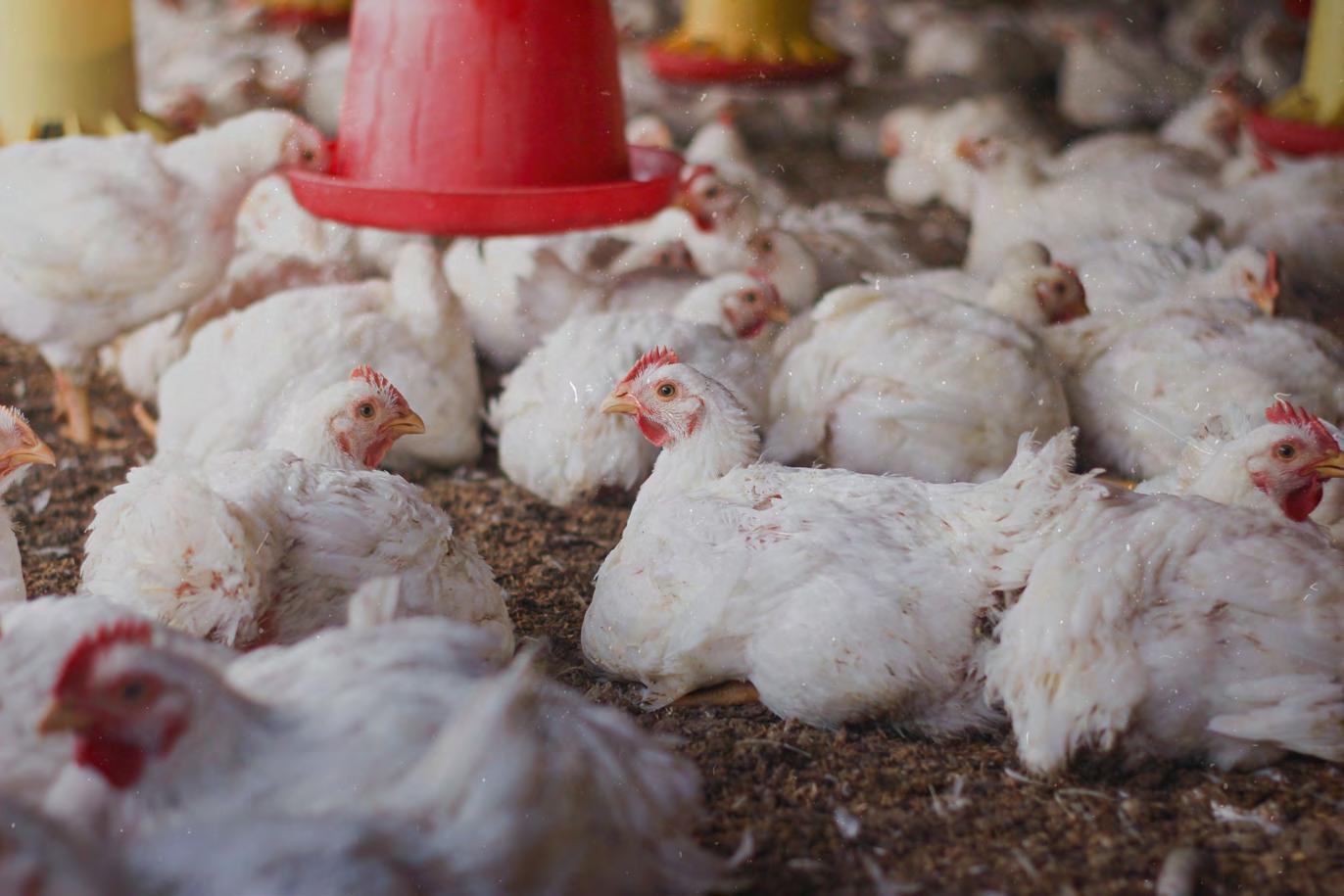
The 2023 Virginia Farm Bureau Federation Young Farmers Winter Expo will take place Feb. 24-26 in Halifax County.
Hotel location and details were still being determined at press time.
Follow the Young Farmers Facebook page at facebook.com/ vafbyoungfarmers for updates and additional expo information.
Women’s Leadership Conference moved to March
The Virginia Farm Bureau Federation Women’s Leadership Conference will be held March 10-12 at the
Westin Virginia Beach Town Center in Virginia Beach.
This year’s theme is “Growing Together from the Mountains to the Ocean.” Registration will close early February.
To register, visit the Women’s Leadership Program website at bit.ly/3HsZCnb or contact Samantha Beard at 804-290-1031 or samantha.beard@vafb.com.
National Ag Day, Agriculture Literacy Week celebrated in March
National Ag Day 2023 will be celebrated on March 21 during National Ag Week, March 19-25.
Virginia Agriculture in the Classroom will hold its annual Agriculture Literacy Week March 13-17 (See related article on Page 27).
Golf tournament will benefit AITC
The annual Virginia Foundation for Agriculture in the Classroom Charity Golf Tournament will be held May 8 at The Dominion Club in Glen Allen.
For more information, contact Angela Buchanan at angela.buchanan@vafb.com or 804-687-4463, or visit AgInTheClass.org.
4 th in the Nation
8 VIRGINIA FARM BUREAU NEWS
Save the Date!
Full funding of conservation practices is historic, Farm Bureau president shares
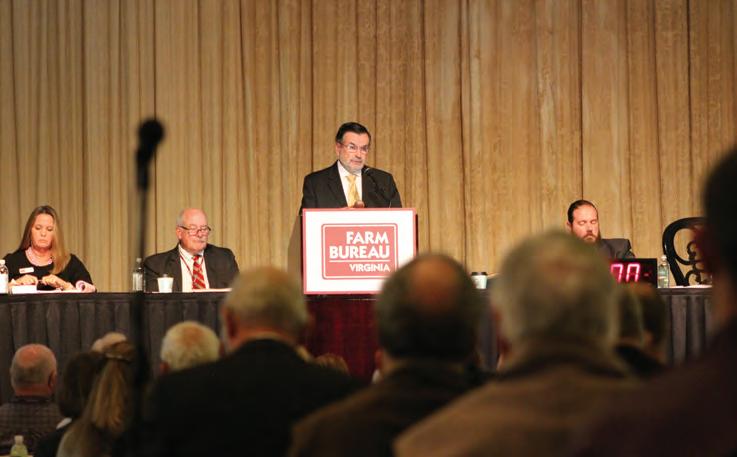
for the organization.
The organization met its membership goal for a sixth consecutive year and then surpassed it by nearly 900 additional members, counting 133,163 members for 2022. “This is truly remarkable, and we couldn’t have done it without all of your help,” Pryor told Farm Bureau leaders.
Another 2022 success was a record-breaking amount of donations raised for Virginia Agriculture in the Classroom, which provides free agriculture-themed resources to educators. A total of $430,000 in donations was raised this past year, Pryor reported.
Virginia Farm Bureau Federation President Wayne F. Pryor said the General Assembly’s approval of full funding for agricultural best management practices is historic.
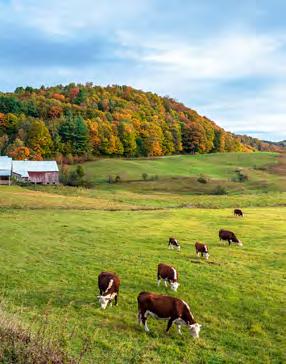
A total of $295 million for the July 1, 2022, through June 30, 2024, biennium was allocated in the state budget to help farmers implement conservation practices.
“This is an unprecedented amount of funding,” Pryor shared Nov. 30 with producers at the VFBF Annual Convention. “Virginia Farm Bureau— on behalf of our state’s farmers—has been advocating for full funding of agricultural best management practices since 2009.”
He advised the farmers in attendance that if they were considering implementing conservation practices on their farms, they should do it now.
“Farmers have always been stewards of their land, and they want to continue preserving our natural resources for the next generations, but conservation practices can be costly,” Pryor explained. “Now that this funding has been allocated, I know many of you will take advantage of this opportunity to improve the state’s farmland and help keep our waterways healthy.”
Pryor also noted that Farm Bureau helped ensure that $1.55 million was included in the state budget for retention of Virginia Cooperative Extension agents and for hiring additional ones.
“Together We Grow” was the theme of the 2022 convention, which was held Nov. 28 through Dec. 1 at The Greenbrier Resort in White Sulphur Springs, West Virginia.
Pryor told Farm Bureau’s volunteer leaders that 2022 was a successful year
And it was announced at the convention that a raffle for a John Deere Gator utility vehicle, sponsored by the VFBF Women’s Leadership Committee, Virginia Tractor and James River Equipment, raised an additional $60,000 for AITC.
Keynote speaker Matthew Lohr, Virginia Secretary of Agriculture and Forestry, credited Virginia Farm Bureau leaders with helping him chart a course for supporting the industry.
Lohr shared that while serving as chair of the Rockingham County Farm Bureau Young Farmers Committee, he was inspired by county Farm Bureau leaders who served on both the Farm Bureau board and the county board of supervisors. “I remember thinking it was so awesome that someone could be a leader in agriculture and leader in Farm Bureau, and also be a leader in local government.” As a result, Lohr went on to serve in the Virginia House of Delegates and represent farmers in the state legislature.
He noted that 77% of the legislature
vafb.com / JANUARY 2023 9
VFBF ANNUAL CONVENTION
to
Wednesday,
The
Eastern
5:30-6:45
Accomack
The
7:00
TOGETHER WE GROW
President Wayne F. Pryor led voting delegates in setting next year's legislative priorities during last year ’s annual convention. Bureau® Federation 2022 Annual Convention
Virginia
Farm Bureau Federation invites you and a guest
join us on
November 30, at
Greenbrier® in White Sulphur Springs, West Virginia, for the
Shore Reception
p.m. in the Colonial Hall, hosted by
and Northampton County Farm Bureaus and
Annual Awards Banquet
p.m. in the Colonial Hall
Virginia Farm
ADAM CULLER
represents urban districts now. “Many (lawmakers) don’t have a strong connection to what we do every day in our agricultural lives,” which is why it’s so important for Farm Bureau members to build relationships with their legislators, he said.
Governor announces that agriculture and forestry are still Virginia’s most robust industries, despite pandemic setbacks
that our agriculture and forestry industries remain strong and deliver the economic growth and development we depend upon that is arguably at the core of Virginia’s history,” Youngkin said.
Pryor, Sink, Hundley re-elected
County Farm Bureau delegates elected Pryor, who farms in Goochland County, to a ninth term as VFBF President. Scott E. Sink of Franklin County was re-elected to a sixth term as vice president. A. Faye Hundley of Essex County was re-elected to a third term as state Women’s Leadership Committee chair.
College, and has earned licenses in elementary education and middle school math.
She has been actively involved in the VFBF Young Farmers Program for many years and serves on the Tazewell County Farm Bureau board of directors and Women’s Committee. She and her husband, Nathan, have represented District 1 on the VFBF Young Farmers Committee since 2019.
a beef cattle and hay operation in Edinburg. Pence succeeds board member Peter Truban, who did not seek re-election.
Re-elected directors
• District 3: Bruce N. Stanger of Montgomery County
• District 9: William F. “Bill” Osl of Cumberland County
• District 12: J. Barry Bates of Essex County
While Virginia’s agriculture and forestry sectors were profoundly impacted by the COVID19 pandemic, Gov. Glenn Youngkin announced Nov. 30 that both industries have recovered lost ground and forged ahead.
The governor quoted figures from a recently completed economic impact study by the University of Virginia’s Weldon Cooper Center for Public Service. The research concluded in October 2022 and found that those industries’ contributions have grown from $91 billion in 2016 to $105 billion. Jobs increased too, with 12,000 people entering the ag and forestry workforces since then, creating a total of 490,000 jobs.

“Everyone in this room plays a vital role in ensuring
Tazewell farmer will represent Young Farmers Michelle Fox of Tazewell County was elected Nov. 30 to a twoyear term as chairman of the VFBF Young Farmers Committee.

The Young Farmers Committee chairman also serves on the VFBF board of directors.
Fox, a Tazewell native, was involved in FFA as a youth and now teaches math at Tazewell Middle School. She holds a bachelor’s degree from Bluefield University and an associate’s degree in education from Southwest Virginia Community
Shenandoah farmer elected to Farm Bureau board Justin Pence of Woodstock was elected Nov. 30 to a threeyear term representing District 6 on the VFBF board of directors.
As a board member, Pence will represent Farm Bureau producer members in Clarke, Frederick, Loudoun, Page, Rappahannock, Shenandoah and Warren counties.
He has served on the Shenandoah County Farm Bureau board for the past 16 years, half of those as the organization’s president. He is a member of the VFBF Member Services Advisory Committee and the Virginia Agriculture in the Classroom Fundraising Committee.
He holds a bachelor’s degree in agriculture from Virginia Tech and currently serves as chief operating officer of BluePoint ATM Solutions. He also runs

County Farm Bureaus win Awards of Excellence
Southampton County Farm Bureau, led by President Gary Cross, received a first place VFBF County Award of Excellence for a countywide effort to expand the Enhanced 911 emergency system database to include farms and their barns and fields, as well as other rural locations. The Southampton Farm Bureau Women’s Leadership Committee spearheaded the effort to work with the Southampton County Fire and Rescue Association to develop an online GPS database of farm locations.
The second-place winner was Wythe County Farm Bureau, led by Jonathan Grimes. The organization’s Women’s Committee developed a hands-on education and demonstration program for 18 urban middle school students with no knowledge of agriculture. The program’s goal was to introduce students to the importance of
10 VIRGINIA FARM BUREAU NEWS
agriculture and show them the wide range of careers in agriculture and agribusiness.
Buckingham farmer wins Farm Bureau Achievement Award
Sarah Large of Buckingham County was named winner of the 2022 VFBF Young Farmers Achievement Award on Nov. 30.


The Young Farmers Achievement Award honors individuals who are successful in production agriculture and provide leadership on and off the farm.
Large’s Cherry Hill Farm is where she and her husband, Frankie, operate a 300-head cow-calf operation and finish 16,000 gilts annually for Smithfield Foods.
Large is a Buckingham County Farm Bureau board member and a district leader for the VFBF Women’s Leadership Committee. She also is chair of the of VFBF Young Farmers Legislative Advisory Committee and serves on the VFBF Legislative Committee and the Virginia Foundation for Agriculture in the Classroom board of directors.
Large will receive a travel package to the 2023 American Farm Bureau Federation Annual Convention in Puerto Rico, where she will compete for
the AFBF Young Farmers & Ranchers Achievement Award.
Goochland agriculturalist wins Young Farmers Discussion Meet
Rachel Henley of Goochland County took top honors Nov. 30 in the VFBF Young Farmers Discussion Meet.
The Discussion Meet is designed to simulate a committee meeting in which discussion and active participation are expected from each contestant. Relevant topics are presented to competitors, who are judged on their discussion skills, understanding of important agricultural issues and ability to build consensus.
Henley grew up riding horses in Hanover County, where she participated in 4-H. Her husband, Thomas, is a fourth-generation farmer on their dairy and grain farm. Henley is involved in the farm’s agritourism component, including sunflower festivals and educational programming for students and other community members.
She is a full-time Virginia Cooperative Extension agent in Powhatan County.

Henley will receive a travel package to the 2023 AFBF Annual Convention in Puerto Rico, where she will compete in the AFBF Young Farmers & Ranchers Discussion Meet.
Wise farmer receives Distinguished Service Award
Gwen Fleming of Pound, who serves as president of WiseDickenson County Farm Bureau, was honored Nov. 30 with a Virginia Farm Bureau Federation Distinguished Service Award.
Fleming was recognized by VFBF leaders for her efforts to support disaster relief last summer, after devastating flash flooding in Buchanan County displaced families, swept houses off their foundations, caused mudslides and blocked and damaged roads.
After an initial fundraising effort among three county Farm Bureaus in the immediate area, Fleming contacted presidents of county Farm Bureaus statewide to ask for help. Checks began to trickle in, then swelled to a wave of support that by late October totaled more than $15,000. The overall Farm Bureau contribution to the effort topped $20,000, from 37 county Farm Bureaus.
Lynchburg-based beef retailer and processing facility Seven Hills Food Co. earned top honors in the first Virginia Foundation for Agriculture, Innovation and Rural Sustainability Agricultural and Forestry Innovation Challenge.

The competition, nicknamed the “Bull Pen,” was held during the convention, and winners were announced Nov. 29.

Seven Hills Food Co. was awarded the competition’s grand prize of $10,000 in addition to $2,500 for placing among the five finalists.
Wilmer Stoneman, VFBF vice president of agriculture, development and innovation, described the Bull Pen as an entrepreneurial competition that facilitates innovation and promotes and supports Virginia agriculture and forestry.
Dalton Mosser, vice president of Seven Hills Food Co., said the company’s entry centered on reducing waste from meat processing and finding value-added markets for cowhides.
Mosser noted that with the prize money from the competition, Seven Hills anticipates infrastructural improvements will help the facility keep more than 2 million pounds of waste out of Virginia landfills annually.
Instead, hides are being used to create premium leather products, marketed in partnership with Bedford County-based leather retailer Moore & Giles.
vafb.com / JANUARY 2023 11
Lynchburg meat processing facility wins inaugural ‘Bull Pen’ challenge
Virginia Farm Bureau® Federation invites you and a guest to join us on Wednesday, November 30, at The Greenbrier® in White Sulphur Springs, West Virginia, for the Eastern Shore Reception 5:30-6:45 p.m. in the Colonial Hall, hosted by Accomack and Northampton County Farm Bureaus and The Annual Awards Banquet 7:00
in the Colonial Hall TOGETHER WE GROW Virginia Farm Bureau® Federation 2022 Annual Convention
p.m.
an agricultural analytics company, finished second and received $5,000 as well
rainbow trout operation Smoke In Chimneys received $2,500 for the Bull Pen’s People’s Choice Award, as well as $2,500 as a finalist.
Falls Church-based innovators Ellipticraft and Newport News-based crop scouting service Pixelar also earned $2,500 as finalists.
Roanoke TV anchor, other news professionals recognized
Neesey Payne, an anchor for television station WDBJ7 in Roanoke, captured Virginia Farm Bureau Federation’s 2022 Ishee-Quann Award for Media Excellence, the top honor in Farm Bureau’s annual Journalism Awards program, for the second consecutive year. Payne also won in the award program’s television category for a fourth consecutive year.
Other 2022 VFBF Journalism Award winners are:
Weekly and semi-weekly newspapers: Kilmarnockbased Rappahannock Record and Rappahannock News, located in Rappahannock County.
Members’ Choice Award: The Princess Anne Independent News in Virginia Beach, nominated by Virginia Beach Farm Bureau President Bobby Vaughan.
Hay bale creations recognized

Women’s Leadership and Young Farmers committees—“Hay, you can COUNT on Farmers.”
Luncheon food sourced from Va. farms
Farm Bureau membership cards

Virginia Farm Bureau members will no longer be mailed printed membership cards.
The 8th annual Women’s Leadership Program Hay Bale Decorating Contest drew 46 entries.

The convention favorite— as voted on by attendees— was “Big Bear Hug” by Kayla Collins from Patrick County. For her win, Collins received a trophy.
The following winners received a trophy and $100.
Best Agribusiness or Commodity Display: Page County Farm Bureau— “Dancing with You Through the Seasons of Life”
Best Community Spirit Display: Page County High School—“Page County is Fueled by Farming!”
Best Agricultural Themed Display: North Fork Middle School—“Rootin’ for Agriculture”

Best Agribusiness, FFA, 4-H or School Display: Orange FFA—John Deere Combine
Most Creative Display: Wythe County Farm Bureau
During the Nov. 29 Farm to Table Luncheon, attendees enjoyed foods sourced from the following Virginia farms: KellyBronze of Albemarle County; Overlook Farms and Produce of Rockingham County; Goldman Farm through Southside Virginia Fruit and Vegetable Producers Association in Charlotte County; Sweethaven Lavender of James City County; and Richlands Creamery of Dinwiddie County.
The cards are available online at vafb.com. After a member logs in, on the My Account page, they need to navigate to the membership section. Once there, a link to “Membership Card” is available.
You also may request a printed copy from your county Farm Bureau office.
Outstanding Young Agriculturalist competition applications accepted through March
The application deadline for high school juniors or seniors interested in competing for the Virginia Farm Bureau Federation Outstanding Young Agriculturalist award is March 31.
The annual award recognizes youth for outstanding academic, community and agribusiness achievements. County-level winners will be notified in early May.
Points are awarded for academics, agriculture experience, leadership, an oral presentation and recommendations.
The state winner will receive a cash scholarship of $1,500 from Virginia Farm Credit Associations, Southern Farm Bureau Life Insurance Co. and the VFBF Young Farmers Committee. The runner-up receives $500, and finalists are awarded $250.
For complete rules and a registration form, visit bit.ly/3DnHclN or email kelly.roberts@vafb.com.

12 VIRGINIA FARM BUREAU NEWS
are now paperless
Virginia Farm Bureau® Federation invites you and a guest to join us on Wednesday, November 30, at The Greenbrier® in White Sulphur Springs, West Virginia, for the Eastern Shore Reception 5:30-6:45 p.m. in the Colonial Hall, hosted by Accomack and Northampton County Farm Bureaus and The Annual Awards Banquet 7:00 p.m. in the Colonial Hall TOGETHER WE GROW Virginia Farm Bureau® Federation 2022 Annual Convention
Tractor cab conversations
Agricultural podcasts inform and entertain farmers while
BY NICOLE ZEMA
Don’t bother setting the table. A good podcast delivers fascinating dinner party conversations directly into the tractor cab.
With hundreds of free agricultural podcasts exploring relevant topics, farmers have an array of options to keep their minds occupied during farm tasks or relaxation time. Podcasts recorded by agriculturalists and industry experts explore issues ranging from technology and innovation to policy, agronomics and more.
American Farm Bureau Federation’s Farmside Chat podcast is hosted by AFBF President Zippy Duvall, featuring 39 conversations with the nation’s farmers, leaders and lawmakers on what it takes to grow a safe and sustainable food supply.
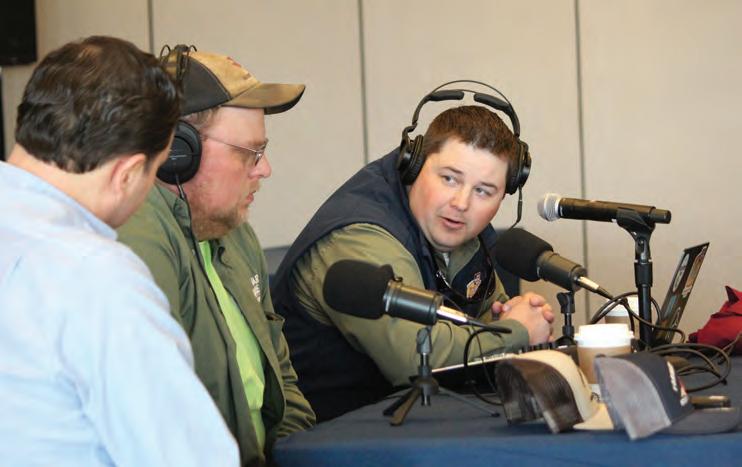
And one Virginia-based podcast, now streaming in its second year, is geared toward stakeholders in the state’s largest private industry.
VFBF Young Farmers cultivate conversations about agriculture
The pilot episode of Virginia Farm Bureau Young Farmers’ podcast, Cultivating Conversations about Agriculture, was recorded in June 2021 by fifth-generation aquaculture, hydroponics and row crop famer Kyle Sturgis of Northampton County, and first-generation cattleman Austin McNett of Augusta County.
“I find I’m often working by myself, so to pass the time, I enjoy listening to podcasts for information, updates and entertainment,” Sturgis said. He had noticed a need for more communication across the Young Farmers network, and Farm Bureau was supportive of the podcast idea.
The hosts invited guests to discuss state-specific issues, including grain marketing, agricultural education, FFA, farmer resources and commodities. According to analytics, listeners tune in from across the U.S. and Canada. A review from BeachGal2020 said, “Amazing insight on agricultural issues impacting farmers today. If anyone wants to learn more about farming or the everyday decisions farmers are confronted with, this podcast is for you.”
‘A sense of community’
The podcast founders recently passed the mic to new hosts Ashley Kuhler and Morgan Slaven, Young Farmers who present their unique industry perspectives in a friendly, conversational style. Kuhler was an FFA leader in the Shenandoah Valley and is now content and community manager for Farmer Focus, a chicken company. Slaven grew up in the sixth generation on a cattle farm in Augusta
County. She now owns her own farm and works full time for the Shenandoah Valley Electric Cooperative.
“Morgan brings a great perspective as a generational farmer, and I bring the contrasting perspective of someone in the agriculture community, so we can present relatable topics that foster connections with our listeners,” Kuhler said.
Their target audience includes anyone interested in rural or agricultural issues, no matter their age or background. The hosts plan to produce one or two podcasts per month.
“Whether enhancing technical skills for their business, or personal development for their quality of life, we want listeners to feel a sense of community when they tune in,” Slaven said. “Hopefully they are hearing something that validates what they are thinking or feeling, which helps motivate them to continue doing what they do for our industry every day.”
vafb.com / JANUARY 2023 13
they’re working or relaxing
Members of the original Young Farmers podcast, Kyle Sturgis, right, and Austin McNett, chat with a guest during the pilot episode.
NICOLE ZEMA
The most recent podcast episode featured discussion of farm stress and mental health with experts from Virginia Cooperative Extension and AgriSafe.

“We hope our audience ends up listening to a podcast with a feeling of belonging and that they are not alone in a challenge or celebration of something they are going through,” Kuhler said. “We also hope to connect them to resources and acknowledge the issues that affect their lives.”
Hear VFBF Young Farmers Cultivating Conversations about Agriculture podcast on Spotify and Apple Music, or the Buzzsprout website: buzzsprout.com/1799499 Submit topic requests via email: youngfarmerspodcast@gmail.com Stream AFBF’s Farmside Chat at: apple.co/3G2f6kn

14 VIRGINIA FARM BUREAU NEWS
your
Tune in at
convenience
Top-five rated agriculture podcasts ranked by traffic and following 1. The Modern Acre 2. Agriculture Technology 3. Field Work Talk 4. Idle Chatter 5. Texas Ag Today
Ashley Kuhler, foreground, and co-host Morgan Slaven are pictured with Laura Siegel, AgriSafe health communications officer, and Virginia Cooperative Extension agent Jeremy Daubert on a recent episode of Cultivating Conversations about Agriculture
‘Didn’t see it coming’
ARTICLE AND PHOTOS BY NICOLE ZEMA
Jane Doe, elements of their story may sound familiar to farmers who struggle to maintain their mental health while contending with farm stress and family crises.

It was during busy harvest season when John became increasingly agitated over a seemingly inconsequential personal matter. Negative emotions he’d buried years in the past were unknowingly triggered and came barreling back with frightening intensity.
said. “We had no choice but to tackle it.”
Weather, equipment breakdowns and a disrupted supply chain, plus the global pandemic, were already creating pressure.
“The money has been forked out to grow that crop,” John said. “It’s capital intensive, with so much out of our control that still impacts the bottom line.”
Now imagine a trampoline stretched tight and then an elephant drops out of the sky, Jane explained.
“W
ho are you, and what have you done with my husband?” Jane Doe suddenly didn’t recognize the man she married when an unforeseen emotional crisis blindsided their Central Virginia farm family in 2020.
Though unexpected, the turmoil was the first step in a healing journey that fostered radical honesty, revealed their strength of character and illuminated the path forward.
While this couple asked to be identified anonymously as John and
His harsh, hurtful words rendered him a stranger to Jane after almost a decade of marriage.
“It was a slow-motion train wreck,” John recalled. “I knew my thoughts were irrational, but it didn’t matter. The train left the station, and there was no stopping it until it derailed.”
An elephant on the trampoline
While dealing with farm stress was nothing new, John’s outburst followed by an inconsolable emotional state was completely out of character. Jane asked her mother to take the kids. The couple spoke more honestly than ever before.
“If we didn’t deal with it, eventually it could have broken our marriage,” Jane
“That’s how it was for us,” she said. “And we didn’t see it coming.”
‘I wasn’t in this alone’
John called a friend in Richmond and disclosed his struggle.
“The next day he was at my house and rode the combine with me all day,” he recalled. “It was very reassuring that I wasn’t in this alone.”
John needed to take a step back from work. Family took over farm tasks and child care.
“His dad would get in the combine, and his mom drove the grain cart,” Jane said. “They would say, ‘Go to dinner and concentrate on each other.’ We
vafb.com / JANUARY 2023 15
Farm Bureau family seeks help and finds healing in season of crisis
couldn’t have done it without that support system.”
Meanwhile, Jane reached out to friends who helped John find a therapist willing to accept new patients. He began telehealth appointments.
“The therapist had a farm background as well, which made it a lot easier, because she understood what I was dealing with on a day-to-day basis,” he said.
With defined goals, new coping tools and fresh perspective, John’s mindset improved.
“Now it’s a scar instead of a wound,” he said. “I learned nothing will change until you’re honest with yourself.”
Strength in vulnerability
Because there often are no signs of an impending crisis, mental health maintenance is crucial. The couple compares it to maintaining farm equipment—small fixes now will prevent major breakdowns in the future.
“The millennial generation sees therapy like going in for a physical,” Jane said. “It’s another part of your overall health.”
While farmers in multi-generational
operations may have advantages like land and capital, there is more pressure to succeed, John said. One of his grandfathers died by suicide, and a great-grandfather was institutionalized after losing his farm.
“I’d like to think we’re more open and accepting to talking about this than previous generations were,” he said.
A recent American Farm Bureau Federation research poll found that farmers and rural residents are more comfortable than they used to be talking about stress and mental health challenges with others, and stigma around seeking help or treatment has decreased in rural and farm communities, though it’s still a factor.
Farming is more than what you do, Jane explained. “It’s who you are. If you primarily define yourself as a farmer, you’re more likely to internalize perceived successes and failures of the farm itself.”
Their message to the agricultural community—be vulnerable with each other.
“They’re probably fighting something themselves,” John concluded. “And it might start an important conversation.”
In crisis? Call or text 24/7
The AgriStress Helpline is available 24 hours a day, 7 days a week and has interpretation services for 160 languages.
Farmers can call or text 833-897-2474 to speak directly with a healthcare professional. Crisis specialists have access to a Virginia-specific curated database of agricultural and health resources.
Resources
VDACS establishes a new resource for Virginia farmers
Last summer, the Virginia Department of Agriculture and Consumer Services launched the AgriStress Helpline for Virginia to provide the commonwealth’s agricultural producers with mental health support.
A call or text to 833-897-2474 connects farmers with trained professionals who can offer support and help find mental health resources in a specific area of the state.

“The physical demands of farming, isolation, weather variability, fluctuating input cost and commodity prices can all impact mental health,” said Matthew Lohr, Virginia secretary of agriculture and forestry. “Stigma and privacy concerns associated with obtaining mental health services may cause some producers to refuse to seek out these very important resources.”
Visit agrisafe.org/agristresshelpline to learn more.
16 VIRGINIA FARM BUREAU NEWS
Recovering from a mental health crisis requires being honest with yourself, one Central Virginia farmer noted.
Robert Saunders wins prestigious Farmer of the Year Award
BY KATHY DIXON
Since its inception in 1990, the Swisher/Sunbelt Expo Southeastern Farmer of the Year Award has evolved into one of the most prestigious agricultural honors in the Southeast, and a Virginia farmer is the 2022 winner.
This is the fifth time that a Virginia farmer has captured the award, beating out nine other state winners from Alabama, Arkansas, Florida, Georgia, Kentucky, Mississippi, North Carolina, South Carolina and Tennessee.

Robert Saunders is a multi-generational farmer who grows field and woody ornamentals, apples, Asian pears, peaches and nectarines on Saunders Brothers Farm in Nelson County.
He grew up on a family farm as one of seven brothers. “As children, my six brothers and I composed the workforce on the farm,” Saunders recalled. “I still have my first paycheck for $13.80 from the summer of 1968 when I was 4 years old. We picked peaches, potted plants, loaded trucks, dug ditches, got up hay, fed and worked cattle, and even milked a Guernsey cow daily during elementary and middle school.”
That kind of work ethic continues today and was one of the reasons
Saunders received the award at the Sunbelt Expo in Moultrie, Georgia, in October. The accolade recognizes excellence in agricultural production and farm management, along with leadership in farm and community organizations.
“Robert and his wife, Pat, have an unbeatable positive attitude, strong work ethic and dedication to agriculture,” said Grace Monger, Virginia Cooperative Extension agent in Nelson County, who nominated Saunders for the award.
She added that “Robert and his family have been incredible supporters of local community activities, including our 4-H program, working hard to give agricultural opportunities to kids from all backgrounds.”
Robert, who holds a bachelor’s degree in agricultural engineering from Virginia Tech, serves as general manager for the farm, which produces 59 fruit varieties on 160 acres and ornamental nursery crops on 260 acre and in 400 greenhouses. Pat retired after working for Nelson County Schools as an art teacher and now provides full-time support for the farm.
The operation was started in 1915 by five brothers who raised rabbits, tobacco and apples. Robert’s dad started growing boxwoods in 1941, and two years ago the Saunders brothers launched NewGen® Boxwood, a genetic company that breeds specialty boxwoods to be disease- and pest-resistant. Robert said some people are surprised to learn that the farm’s “signature plant” is boxwoods.
Their boxwoods have become so well-known in the industry that they were selected for the White House Rose Garden restoration in 2020. Saunders Brothers was the exclusive supplier of the boxwoods in the garden.
All those plants require a lot of labor. There are currently 160 full-time employees working at the farm, including 100 H-2A workers, who are “key” to the operation, Robert said.
Since labor is the farm’s biggest expense, “we’ve worked really hard to mechanize and automate,” he explained. They bought machinery from Europe that helps prune plants faster, and the greenhouses employ a state-of-theart irrigation system that conserves water. The computer-generated evapotranspiration system decides how much water each plant needs based on its size, weather conditions like wind and humidity and other factors. And the water is automatically dispensed.
“This cut our water use in half immediately,” Robert noted.
That smart farming has carried over into succession planning for the next generation of farmers. Robert and three of his brothers, Bennett, Jim and Tom, broadened their management team and created an apprenticeship program for new employees, including their own children, who they require to apply for jobs.
Robert and Pat’s daughter, Annie Saunders Burnett, runs the Saunders Brothers Farm Market, and their son, Robert Price, is participating in the farm’s 40-week apprentice program to learn about each component of the business before choosing a slot that best suits his skills.
vafb.com / JANUARY 2023 17
Pat and Robert Saunders are proud of their Saunders Brothers Farms’ greenhouses with state-of-the-art irrigation systems.
KATHY DIXON
Damaging diseases: Emerging pathogens on crop researchers’ radar
BY ALICE KEMP
Plant diseases are producers’ nemeses. They wreak havoc on crops if not caught early, resulting in yield loss, damaged product and lost income.
From row crops to fruit and vegetables, every crop is affected by diseases. And while scientists develop disease-resistant varieties, and farmers can use fungicides and management plans, new diseases emerge or old ones become resistant to treatment.
Corn tar spot
“For the first time, we’ve identified tar spot on corn in Virginia,” said David Langston, plant pathology professor and Extension specialist of Virginia Tech’s Tidewater Agricultural Research and Extension Center in Suffolk.
Corn tar spot is an invasive fungal disease that has heavily impacted corn crops in the Midwest. Identified by small, raised circular black spots on corn husks, leaves and stems, it causes leaf tissue death, stunts kernel development and causes significant yield loss.
While it was first seen in Virginia last September and hasn’t caused major problems yet, Langston and other researchers are closely monitoring the disease.
Pumpkin plectosporium blight
An emerging disease on cucurbits like squash and watermelon, plectosporium blight is becoming a persistent issue for Virginia’s pumpkin growers.
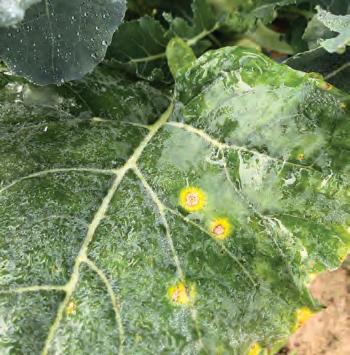
“We’ve seen it more in recent years,” said Langston, who is studying the soil-borne disease along with Steven Rideout, a fellow Virginia Tech plant pathology professor. “A lot of people don’t know what it is, or they’ve never heard of it.”
Identified by white and tan lesions on pumpkin stems and stalks, the fungus can spread quickly—stunting growth and reducing marketability.
“In some fields where it’s been severe, we’ve probably lost as much as 50% of the fruit,” Rideout explained.
Guava root-knot nematode
“We’re currently monitoring for the guava root-knot nematode, which has caused serious problems in North Carolina,” Langston said.
While not seen in Virginia yet, the nematode parasite presents a substantial threat if it migrates. One of the most damaging and aggressive nematodes, it primarily affects sweet potatoes causing root damage, early plant death and yield loss. It also could affect cotton, curcurbits, peppers, soybeans, tobacco and tomatoes, even varieties with resistance to other root-knot nematodes.
Tomato brown rugose fruit virus
While Rideout said they haven’t seen tomato brown rugose fruit virus in Virginia yet, it’s on everyone’s radar as “it definitely threatens the tomato industry” with damaged fruit and severe crop loss.
Rideout explained the seedborne disease is endemic in Mexico, and there have been some greenhouse outbreaks in Arizona and California.
“We import a lot of tomato fruit from Mexico,” he said. “We’re definitely keeping our eyes open for it here in Virginia.”
Broccoli alternaria

Because alternaria leaf spot and head rot is the most disastrous disease for broccoli on the East Coast, pathologists are focusing heavily on this fungal disease that enjoys damp weather and
humidity. Langston and Rideout are part of a federal grant study to learn more about the disease and develop better controls, as some studies have shown it may be developing a resistance to certain fungicides.
“We’ve seen more problems with this disease,” Rideout said. “It causes leaf spots, but where it’s really destructive is when it gets into the crown of the plant–it’s not marketable.”
Diseased crops include broccoli and its leaves, this page. Facing page, clockwise from top left, tar spot, guava root-knot nematode, and plectosporium blight on pumpkin stems and an immature pumpkin.
18 VIRGINIA FARM BUREAU NEWS
PHOTOS COURTESY OF VIRGINIA
Montgomery County
Pumpkin grower keeps plectosporium at bay
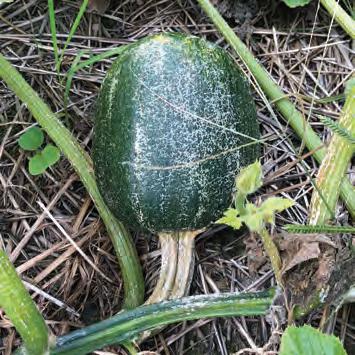
Dan Brann of Brann and Long Farms in Montgomery County says spending hundreds an acre on fungicide is a reasonable tradeoff to keep diseases out of his pumpkin field.
“I just added up how much we spent, and I guess we scared the plectosporium away,” he chuckled.
A high-value crop worth thousands of dollars an acre, pumpkins are favored for their aesthetics. In addition to plant death, plectosporium causes rough brown patches, making pumpkins unmarketable—something that “certainly was a big issue some years,” Brann said.
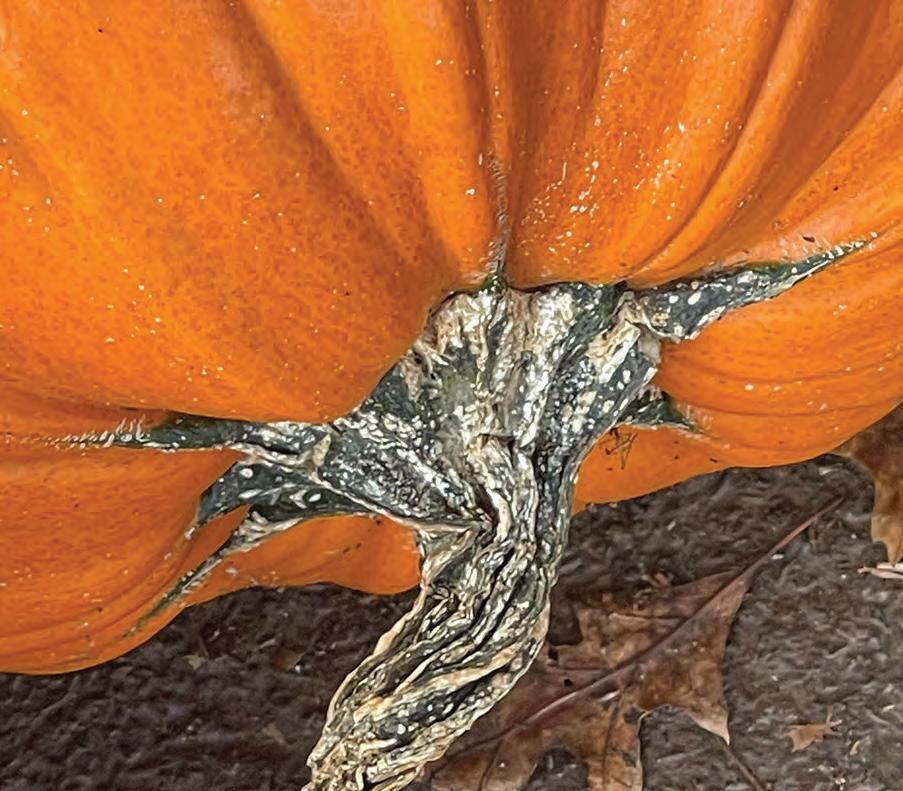
Brann has managed the disease with a broad-spectrum fungicide applied early in the growing season. He then balances it with fungicides that target other diseases like powdery mildew. He applies fungicide about every 10 days to 2 weeks.
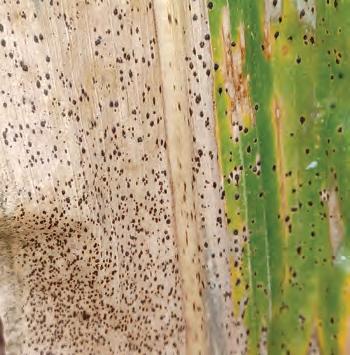
“I’m using more fungicides to help control it, so while I’ve had some plectosporium most years, I haven’t had it as a major quality factor for the last few years because of the fungicide program.”
He also incorporates crop rotation— growing pumpkins in a field one year and wheat the next—to keep pests and pathogens from accumulating in the soil.
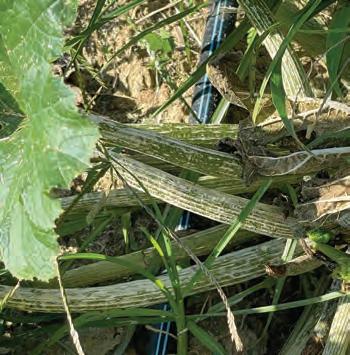
“Raising pumpkins on the same field every year is really asking for trouble,” he explained. “Rotation’s very, very important.”
While Brann has found a program that works for his field, Langston and Rideout said there’s still work to be done to better understand the disease and its spread, when to apply fungicides and how to identify varieties less susceptible to the disease.

vafb.com / JANUARY 2023 19
TECH
Department of Labor announces final rule updating H-2A temporary agricultural program
BY NICOLE ZEMA
Virginia’s foreign labor contractors and farmer advocacy groups have mixed feelings about the U.S. Department of Labor’s final rule to amend H-2A temporary labor regulations.
The H-2A program allows employers to fill temporary labor needs by hiring foreign agricultural workers when there are not sufficient local workers who are able, willing, qualified and available, and when doing so will not adversely affect the wages of U.S. workers in similar jobs.

The new rules are intended to strengthen worker protections, modernize and simplify the application process and ease regulatory burdens on employers. The changes especially impact Virginia’s farm labor contractors filing with the H-2A program, said Cindy Webb, program manager at the Virginia Employment Commission’s Agriculture and Foreign Labor Certification.
“The Department of Labor’s modernization efforts to the application process and updating current
regulations that govern the program are appreciated, and there are some positive changes to come from this final rule,” said Zach Jacobs, legislative specialist with Virginia Farm Bureau Federation governmental relations. “But there are still a few areas of concern with the final rule that continue to burden employers with strict regulations and limit opportunities.”
Executives at H-2A consultant firm másLabor in Nelson County also lauded some decisions and expressed disappointment in others.
Tom Bortnyk, másLabor senior vice president and general counsel, said they’re pleased with new regulations that don’t limit truck drivers’ geographic reach, and other decisions that mandate digital signatures, clarify safety regulations and some employment obligations, and digitize surety bonds.
He praised tweaks that modernize procedures for determining the prevailing wage.
“The final rule abolishes the very loose standards for state workforce agency-conducted prevailing wage
surveys in favor of uniform standards and criteria,” Bortnyk said. “It will provide much greater transparency and reliability.”
It’s a simpler methodology, Webb added.
“It also grants explicit authority for the state to allow other state agencies like universities to conduct the wage survey and make the findings on behalf of state workforce agency,” she said.
But Farm Bureau sees the rule as problematic.
“These standards do not take into account the current economic situation facing producers coupled with affordability and predictability,” Jacobs said.
Other changes fall short, Bortnyk continued. Proposals that would allow employers to stagger start dates or eliminate certain recruitment provisions were rejected. And the final rule now abolishes the “two-contiguous states” flexibility, requiring all H-2A applications be limited to a single area of intended employment.
“This provision will increase the
20 VIRGINIA FARM BUREAU NEWS
FILE PHOTOS
transaction costs for employers currently taking advantage of this flexibility,” Bortnyk said.
The final rule explicitly states that employers who file jointly are all responsible for any potential liability. While this gives workers adequate recourse for labor violations, “this means that joint employers may be liable for back wages or civil money penalties, even if they were not directly responsible for the violation,” he continued.
Farm Bureau was supportive of a proposal to replace the “50% rule” with a 30-day rule, which was rejected. H-2A employers must provide employment to any qualified, eligible U.S. worker who applies for the job opportunity until 50% of the work contract period has elapsed.


Webb said the final rule aims to improve safety and health protections for workers housed in rental or public accommodations, and adjust the housing certification process to allow state and local authorities to conduct annual inspections.
According to Farm Bureau, housing is one of the biggest barriers to entry for employers turning to the H-2A program for their labor needs. The ruling imposed Occupational Safety and Health Administration temporary labor camp standards for all rental and public accommodations.
“This creates more burdens for farmers, as many hotel and motel locations will not meet this strict new standard,” Jacobs said.
Bortnyk agreed housing provisions may limit employers’ options and make it difficult to locate usable housing.
“The final rule does not adopt a proposal to allow worker housing approval for up to 24 months, reducing the frequency of inspections and reducing transaction costs for employers,” he said.
For more information about H-2A rules and other worker protections, contact a toll-free helpline at 866-4US-WAGE (866-487-9243).
vafb.com / JANUARY 2023 21
Reforestation program turns 50
BY ADAM CULLER
To Virginia farmers, sustainability is more than just a buzzword.
The commonwealth’s farmland and timberland provide farmers’ their livelihood. Landowners understand more than most that keeping their parcels in production is essential for Virginia’s economic and environmental future.
The Reforestation of Timberlands Program, administered by the Virginia Department of Forestry, recently celebrated its 50th anniversary. Through the help of this program, farmers and other rural landowners have been able to sustain Virginia’s forests for future generations.
The RT program was born from a
survey conducted in 1966 that revealed pine was being overcut in Virginia. It was officially enacted by the Virginia General Assembly in 1970 with the objective of giving landowners incentive to plant or improve pine stands on their properties.
Five decades later, the program continues as a pine establishment initiative that provides cost-share money to private and non-industrial landowners who want to reforest their land with pine.
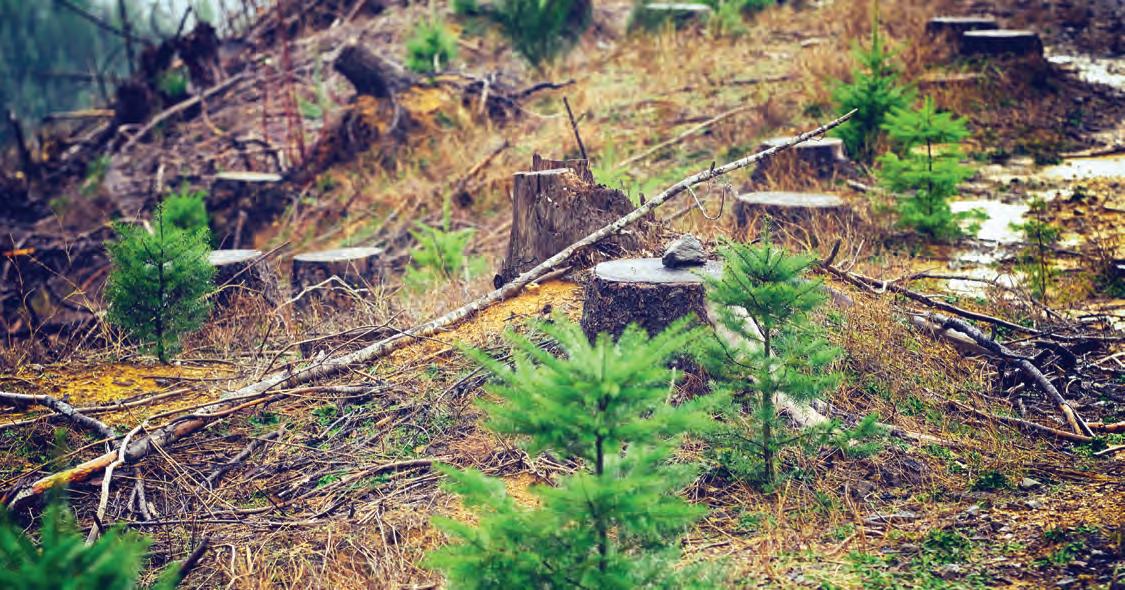
Its original goal—to support the sustainability of Virginia’s pine resource and to maintain it—has endured the test of time, said Dean Cumbia, VDOF director of forest resource management.
“There have been some changes and tweaks, but the purpose has been steadfast throughout the history,” he said. “I think that’s what has made it so successful.”
Funding future forests
Cumbia noted the RT program has served over 52,000 landowners and has facilitated the reforestation of more than 2 million acres of Virginia timberland since its inception.
Todd Groh, who oversees the RT program as VDOF forest resource management program manager, said that the program has historically catered to “your average landowner.”
The program is funded by the Virginia
22 VIRGINIA FARM BUREAU NEWS
The Virginia Department of Forestry’s Reforestation of Timberlands Program has promoted and incentivized responsible forest management practices for five decades.
The state’s reforestation program provides cost-share money to landowners who reforest their land with pine trees.
Forest Products Tax, which is matched by Virginia’s general fund. The funds then partially reimburse reforestation expenses for site preparation, planting and release cutting, and the removal of competing hardwood trees from pine stands.
Program-funded projects are capped at 100 acres per year for a single landowner, though the average project size is 38 acres of reforestation.
To receive funding, landowners must submit a one-page application to VDOF. After the application has been accepted and an agreement outlining project requirements is signed by the landowner, VDOF foresters will help connect them with contractors to aid the project’s completion.
Once the project is completed and invoiced, as much as 75% of the total cost may be reimbursed to the landowner. Historically, the average repayment rate for RT projects is 42%.
“We want to spread the funds as far and wide as we can,” Groh added. “If a landowner is sitting on the fence thinking if they should or shouldn’t (follow through with a project),
we want to give them just enough incentive to do it, but not enough to pad their pockets.”
A helping hand
The benefits of the RT program are abundant. Cumbia said reforestation not only promotes carbon sequestration, biodiversity and soil and water conservation, it also stimulates Virginia timber markets.
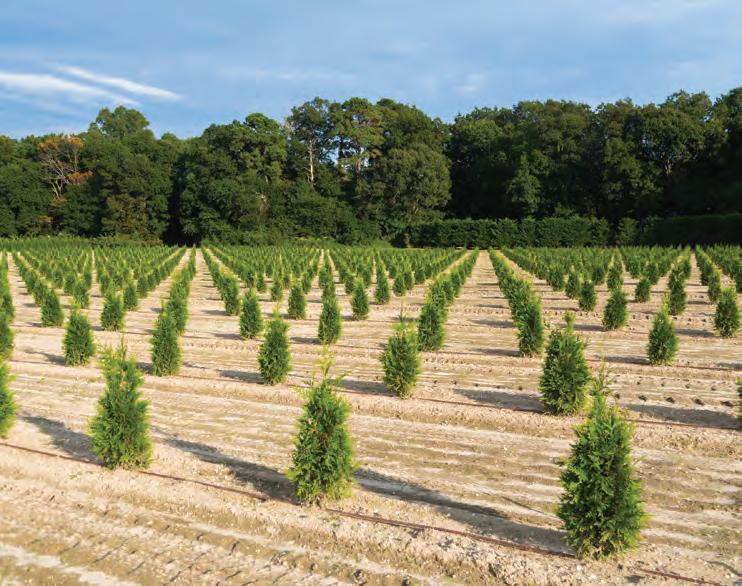
Miller Adams, a VDOF area forester and president of Charlotte County Farm Bureau, noted the program has increased funding in recent years. He said legislators are to thank for the support, as well as the determined lobbying efforts of the Virginia Farm Bureau Federation.
“For us field foresters out here working with landowners, we’re seeing that there’s more demand for the program than there is funding,” Adams said. “Farm Bureau has gone to the plate on many occasions, and funding has been an issue they’ve really gotten in front of legislators with.
“Hopefully that will continue in the future.”
The three pillars
of planning
Because Reforestation of Timberlands Program projects require financial investments and land-use commitments that can last decades, interested landowners should adhere to the “Learn, Plan, Act” process.

LEARN
Landowners should first identify objectives for their property, both immediate and long-term. Once those goals are identified, landowners should consult with fellow landowners, foresters and other unbiased professionals and agencies, such as VDOF or consulting foresters, to learn how to achieve them.
PLAN
After identifying their objectives, landowners then can develop a land-management plan to serve as a roadmap for the forest that will be grown on their property. Experienced VDOF foresters can help determine the best course of action for landowners to meet their goals, and can assist in evaluating their land to provide forest-management recommendations.
ACT
Landowners can begin to move forward with their projects and work toward achieving their goals.
vafb.com / JANUARY 2023 23
Manage your money with help from Farm Bureau Bank
BY ADAM CULLER
For nearly a quarter century, Farm Bureau Bank has helped farmers and Farm Bureau members across the country manage their finances.
Farm Bureau members in Virginia have access to dozens of member benefits, including the opportunity to bank with Farm Bureau Bank. The institution operates with farmers’ interest in mind, offering those with an agricultural background valuable resources when it comes to wealth management.
Farm Bureau Bank also offers special pricing, promotions and perks that are exclusive to members.
The bank offers a wide variety of products ranging from personal or business banking services to loans for farming equipment.
Deposit services geared for personal accounts can help customers better track their everyday expenses and grow their savings. Deposit products include interest-bearing checking accounts, money market accounts, certificates of deposits, individual retirement accounts, health savings accounts and more.

Farm Bureau members also may finance new and used passenger vehicles, ATVs, boats, RVs and motorcycles, as well as new and used farm machinery.
Business owners can take advantage of business services that are designed to assist companies conduct business more efficiently and help improve cash flow and returns on investment. Services in this department include account management, specialized checking accounts for businesses, and access to Visa Premier Business credit cards that offer rewards.
Members also may apply for the Farm Bureau Member Rewards Mastercard, which offers triple reward points on gas,
grocery and dining purchases; double reward points on select Farm Bureau member benefit partners, including Virginia Farm Bureau insurance products; and single reward points for all other purchases.1 The card also has no annual fee.2
“With everything Farm Bureau Bank offers, I think it’s safe to say this is an extremely valuable benefit to our members,” remarked Gerald Gardner, director of sales for Virginia Farm Bureau Mutual Insurance Co. “They’re in tune with what our farming members need when it comes to their banking needs, which may not necessarily be the case with all banks and lending institutions.”
Gardner noted that while all of Farm Bureau Bank’s services are useful to customers, certificates of deposits—or CDs—may be of greater interest to customers amid growing interest rates and inflation.
CDs are one type of high-interest savings accounts that may be opened with deposits of $1,000 or greater. CDs often offer higher interest rates than standard savings accounts.
Certificates of deposits have term lengths, normally between three months and five years, where the initial deposit earns interest, or “matures.” CDs generally require deposits to remain untouched over the course of the term, otherwise the customer would be subject to a withdrawal fee.
However, customers may choose the term length that best meets their needs. Because of their flexibility and accessibility, CDs are considered a low-risk strategy.
“With the environment we’re in with interest rates and inflation, CDs are an excellent option for people who prefer
a more conservative approach to saving and investing their money,” Gardner said. “Depending on your financial situation, a CD may be a better fit than a normal savings account or money markets, and they’re not as volatile as putting money into stock.”
To learn more about Farm Bureau Bank, visit vafb.com/ membership-at-work/membership/ benefits, and scroll to Farm Bureau Bank. Alternatively, members may visit farmbureau.bank.
1 Purchases mean any signature or pin-based, online, contactless, phone or mail-order purchase made with the Farm Bureau Member Rewards Mastercard. Offer excludes Cash Advances, Balance Transfers, credits and returns. Points expire after four full years. Program may change or be cancelled at any time. 3X reward points on qualifying transactions, up to $1,500 quarterly. 2X points may vary by state. Visit www.farmbureau.bank/creditcards to see what double point benefits your state receives. See complete Terms and Conditions for the Farm Bureau Member Rewards Mastercard and Member Rewards Program at www.farmbureau.bank/creditcards.
2 Other fees may apply. For full Terms and Conditions, visit www.farmbureau.bank/creditcards.
Banking services provided by Farm Bureau Bank, FSB. Farm Bureau, FB, and the FB National Logo are registered service marks owned by, and used by Farm Bureau Bank FSB under license from the American Farm Bureau Federation. Member FDIC. Equal Housing Lender.
24 VIRGINIA FARM BUREAU NEWS
Protect your farm property from inflationary effects with a policy review
BY ADAM CULLER
Depending on which study you read, inflationary prices on everything from food to farming supplies may be around for the foreseeable future.
Near the end of 2022, inflation had driven up the price of diesel fuel by 43% and raised the price of some fertilizer components by as much as 28%. Additionally, lingering effects from the COVID-19 pandemic continue to cause supply chain challenges for consumer products across the board, as well as labor shortages.
Scott DeNoon, senior farm product and underwriting manager for Virginia Farm Bureau Mutual Insurance Co., noted inflation has caused certain types of property to depreciate at lesser rates than usual. In consideration of this trend, DeNoon warned that some farmers’ policies may need attention because their coverage amounts may not be adequate moving forward.
“In most cases—based on the current economic conditions we’re experiencing —the values of property such as farming equipment, barns, sheds and dwellings have increased quite a bit,” DeNoon explained.
“The cost to repair or reconstruct dwelling and farm structures has increased due to the rising cost of building materials and labor,” he added. “Likewise, the cost to purchase or repair
vehicles and farming equipment has increased because of parts shortages. That’s why it’s very important for farmowner policyholders to make sure they have the coverage they need from a value perspective.”
With so much volatility happening at once, DeNoon recommended farmers take the time to review their farmowner policies immediately.
Because some farmers have more downtime during the winter months, he also said the seasonal slowdown gives them added time to meet with their Farm Bureau agent to do a comprehensive coverage review.
“When you consider the impact of inflation, these meetings will help you make sure everything is where it needs to be from a coverage perspective,” DeNoon said. “These meetings with an agent really help customers understand where they have coverage and where they don’t. When it comes time to use that policy, you need to make sure that it’s going to provide the coverage you expect.”
Keep your business moving with an added endorsement
Due to prolonged supply chain issues and increased wait times for repairs, there may be instances where farmers need to spend extra money to continue
normal business operations after an insurance claim.
In these instances, policyholders can endorse their farmowner policies with a Farm Extra Expense Coverage endorsement, which provides reimbursement for those additional expenses.
The endorsement compensates farmers for covered losses to insured farm buildings and structures, equipment and other types of personal property.
“Let’s say you have a tractor or a piece of farming equipment that’s out of service due to a covered loss—it’s common these days for dealers or repair facilities to have difficulty getting the parts to fix that equipment,” DeNoon said.
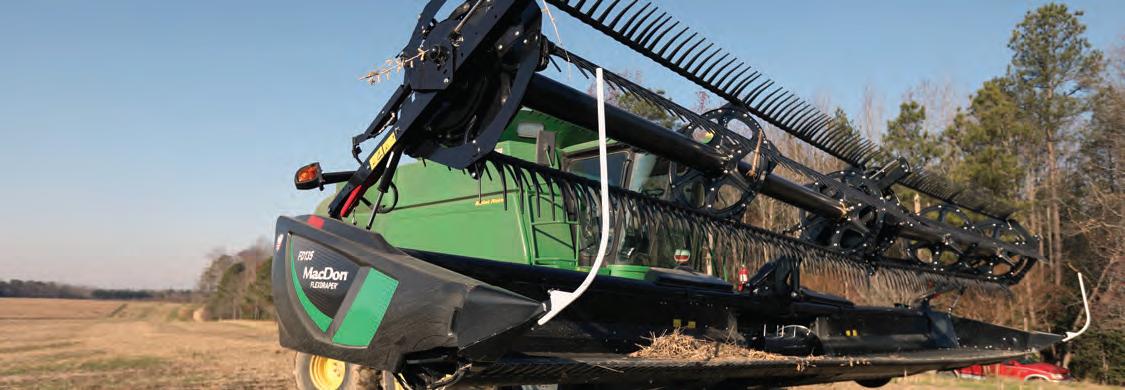
“If that equipment is needed to complete a time-sensitive task such as planting or harvesting, it may be necessary to rent or borrow a piece of equipment. With the Farm Extra Expense Coverage endorsement, it would provide reimbursement for the cost of renting that equipment until the damage to your machinery can be fixed or replaced.”
To learn more about farm owner insurance products, visit vafb.com/ insurance/farm or call your local Farm Bureau agent.
vafb.com / JANUARY 2023 25

I Love Strawberries selected for AITC Book of the Year

Virginia Agriculture in the Classroom’s annual Agriculture Literacy Week will take place March 13-17.
The organization has chosen I Love Strawberries, written by Shannon Anderson and illustrated by Jaclyn Sinquett, as its 2023 Book of the Year. The book takes readers on a journey following strawberry-loving Jolie as she grows her own fruit from seedling to table with the help of her faithful rabbit sidekick, Munchy. The colorfully illustrated and humorous book gives readers a peek into everything involved when cultivating the delicious berry.
Agriculture Literacy Week is the largest educational event of the year for AITC, with thousands of volunteers reading to children across the commonwealth. Now in its 12th year, the program helps teach youth about the importance of agriculture, farming and the sources of their food.
“Volunteer agriculture advocates are excited to have an opportunity to share a book and personal examples about farm life with children from across the state. This book also highlights the importance and excitement around entrepreneurship. Creating a connection from farms to food is vital to understanding the importance of agriculture to our daily lives,” said Tammy Maxey, AITC executive director.
Copies of I Love Strawberries are available for purchase at $14 each from Virginia AITC. A book order form is located on the Virginia AITC website, AgInTheClass.org
In addition to the book, orders will include free supplementary resources to expand learning at school and at home. These include reading tips, coloring pages and other free activities.
Volunteers are encouraged to read I Love Strawberries to children in pre-K through third grade. Virginia AITC also will share highlights on its social media platforms throughout the week.
Agriculture Literacy Week volunteers include county Farm Bureau volunteers, Farm Bureau women’s leadership and Young Farmers committees; FFA and 4-H members; partners from the Virginia Department of Agriculture and Consumer Services and other state agencies; and members of other agricultural organizations and businesses. Colonial Farm Credit, Farm Credit of the Virginias and Southern States Cooperative Inc. have been supporters as well.
For details or to order books, visit AgInTheClass.org
Changes to new farm bill under consideration, on Real Virginia
Featured this month on Real Virginia, Virginia Farm Bureau’s weekly television program:
• Lawmakers are considering changes to the 2023 Farm Bill, and Farm Bureau members are weighing in.
• Virginia agriculture and forestry have recovered from the pandemic, and together are still the state’s top private industries.
• Sheep and maple syrup reign supreme in Alleghany County, featured on this month’s County Agricultural Close-up
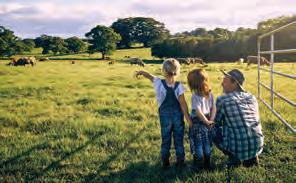
Real Virginia airs nationwide at 3:30 p.m. on the first Saturday of each month on RFD-TV on Dish Network and DirecTV, and on selected cable outlets around the state. It airs weekly on WBRA digital channel 15.2, WHRO Norfolk, WVVA Bluefield and WTKR Norfolk, and on the first and third weekends of each month on WVIR Charlottesville, WHSV Harrisonburg and WRLH Richmond.
Real farmers, sharing real stories, on real farms
A weekly television program produced by Virginia Farm Bureau ®
Agriculture touches your life every day! Meet the Virginia farmers who raise products for your table and your community. Learn how to prepare delicious Virginia foods and cultivate a lush landscape and edible garden.
Real Virginia airs nationwide at 3:30 p.m. on the first Saturday of each month on RFD-TV on Dish Network and DirecTV, and on many cable outlets—check local listings.
Watch anytime at vafb.com, and weekly on
WBRA digital channel 15.2 • WHRO Norfolk
Watch the first and third weekends of each month on • WRLH Richmond • WHSV Harrisonburg
• WTKR Norfolk • WVVA Bluefield • WVIR Charlottesville • WSLS Roanoke
vafb.com / JANUARY 2023 27
REAL VIRGINIA •
Warm up this winter with a tasty bowl of chili
Beef Chili Carnivale
TOPPINGS
Cold, blustery temperatures can lead to warming up with a hearty bowl of chili after working outdoors.
A cold-weather classic, chili’s origins are difficult to determine. Many historians believe the classic chili we know today, chili con carne—chili with meat—has roots in the American West, particularly Texas. It’s believed to have been popularized in San Antonio during the 1880s when “bowls o’ red” were sold at a market by women who were named “chili queens.” A caloriedense meal, the dish was popular among cowboys and pioneers.
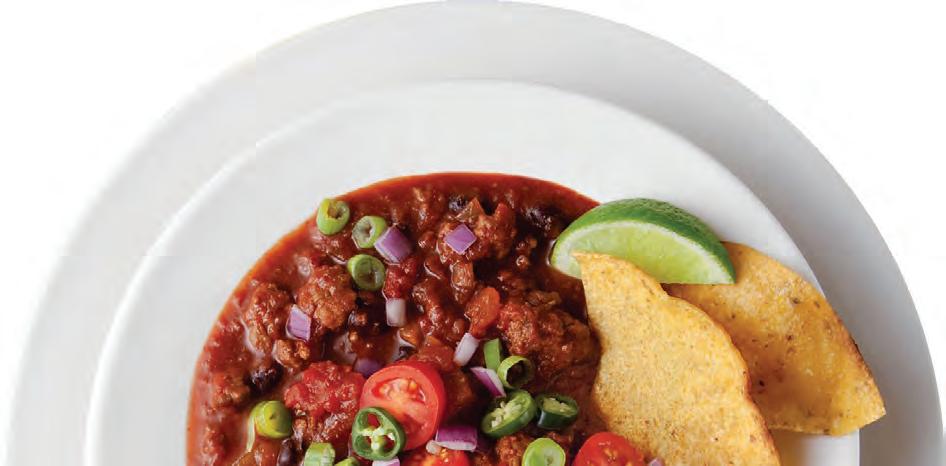
While traditional chili is prepared with meat, chili peppers and onions, the dish has evolved over time, with home cooks creating their own unique twists with a variety of ingredients, flavors, spices and cultural influences. But one ingredient remains divisive, and has been hotly debated for decades—beans or no beans?
INGREDIENTS
2 pounds ground beef, 93% lean or leaner
28-ounce can crushed tomatoes, undrained
14.5-ounce can diced tomatoes with mild green chilies
14.5-ounce can beef broth 12-ounce bottle of beer
1 medium yellow onion, diced
2 medium green, red, yellow or orange bell peppers, diced 6-ounce can of tomato paste ⅓ cup chili powder
1 large jalapeño pepper, seeded, finely chopped
2 tablespoons minced garlic
1 tablespoon ground cumin
1 teaspoon dried oregano
2 15-ounce cans black beans, rinsed and drained, optional
lime wedges and tortilla chips, optional
Sliced cherry tomatoes, sliced green onions, sliced serranos or jalapeños, chopped onion.
DIRECTIONS
Pre-heat a stock pot over medium heat until hot. Add the beef, and cook 8-10 minutes, breaking the meat into ¾” crumbles, stirring occasionally. Pour off drippings as necessary.
Add tomatoes, broth, beer, onion, bell peppers, tomato paste, chili powder, jalapeño, garlic, cumin and oregano to stock pot, stirring to combine. Bring to a boil, reduce heat, and simmer uncovered for 45 minutes, stirring occasionally.
Stir in beans, if using, and continue to simmer for 15 minutes or until chili is thickened to the desired consistency, stirring occasionally.
Season with salt and black pepper as desired. Garnish with toppings, and serve with lime and chips.
—Recipe adapted from Beef, It’s What’s For Dinner
28 VIRGINIA FARM BUREAU NEWS Heart of the Home
Polynesian Chili
INGREDIENTS
1½ pounds boneless pork, cut into 1” cubes
31 ounces Great Northern beans, drained
14.5-ounce can Mexican-style stewed tomatoes, undrained
1 cup chopped onions
⅔ cup chopped green bell pepper
6 ounces tomato paste
2 garlic cloves, minced
1 tablespoon chili powder
2 tablespoons ground cumin
⅛ teaspoon black pepper
20-ounce can pineapple chunks, drained
DIRECTIONS
Place all of the ingredients, except the pineapple, into a 3½-quart slow cooker. Mix until well combined, cover, and cook on low heat for 6-7 hours or until the pork is tender, stirring once halfway through, if possible. Stir in the pineapple just before serving.
—Recipe adapted from Pork Checkoff, National Pork Board
Chunky Vegetarian Chili
INGREDIENTS
1 tablespoon vegetable oil
2 cups chopped onion
½ cup chopped yellow bell pepper
½ cup chopped green bell pepper
2 garlic cloves, minced
1 tablespoon brown sugar
1½ tablespoons chili powder
1 teaspoon ground cumin
1 teaspoon dried oregano
½ teaspoon salt ½ teaspoon black pepper
2 16-ounce cans stewed tomatoes, undrained
2 15-ounce cans black beans, rinsed and drained
15-ounce can kidney beans, rinsed and drained
15-ounce pinto beans, rinsed and drained
DIRECTIONS
Heat the oil in a Dutch oven over medium high heat. Add onion, peppers and garlic, and sauté for 5 minutes or until tender. Add the sugar and remaining ingredients, and bring to a boil. Reduce heat, and simmer for 30 minutes.
—Recipe adapted from North Carolina Cooperative Extension
White Chicken Chili

INGREDIENTS
1 pound dry white beans
2 small roasted chickens
6-8 garlic cloves, chopped
2 onions, chopped
1 tablespoon cooking oil
4-ounce can of green chilies
1 cup sour cream
8 cups chicken broth
1 tablespoon ground red pepper
2 teaspoon oregano
12 ounces Monterey Jack cheese, shredded
DIRECTIONS
Soak beans overnight, or cook for 4 hours in water. Shred roasted chickens.
In a skillet, sauté garlic and onions in cooking oil. Add chicken, chilies, sour cream and broth. Adjust the amount of broth and chicken to reach desired consistency. Add the spices and cheese, and heat until melted.
This recipe is very easy to personalize. While it should be thick, add water if needed, or use less chicken. Also, add extra spices if it is not spicy enough for your tastes. Bringing to a boil and cooking for extra time will help thicken the chili if needed.
vafb.com / JANUARY 2023 29
—Recipe adapted from Chicken Roost, National Chicken Council
Chicken and sour cream blend together in a creamy alternative to traditional chili.
Missed open enrollment? You still have health coverage options
BY ADAM CULLER
When it comes to obtaining health insurance for the upcoming year, open enrollment periods typically are the only time individuals can sign up for coverage.
While open enrollment periods vary for most businesses, the Affordable Care Act open enrollment period to purchase individual health insurance for 2023 runs from Nov. 1, 2022, through Jan. 15.
If you missed you employer’s open enrollment period or the ACA enrollment deadline, there still are options to secure some form of health coverage for 2023.
Special enrollment periods
If you’ve experienced certain life events, you may qualify for a special enrollment period. These periods allow individuals to sign up for health insurance outside of conventional open enrollment periods.
According to Healthcare.gov, qualifying events for a special enrollment period include getting married or divorced; having a child; changing residences; losing health coverage due to the death of the primary policyholder; losing a job or group coverage; or losing Medicaid or Children’s Health Insurance Program coverage. These events generally will trigger a 60-day period in which a person can
purchase health coverage and, in some cases, dental and vision insurance.
Employers who offer insurance to their employees are required to provide a special enrollment period of at least 30 days.
Short-term health insurance
Individuals who don’t qualify for a special enrollment period may purchase short-term health insurance plans to provide temporary coverage. Though these plans do not meet ACA requirements for minimum coverage, they will offer basic protection against catastrophic medical expenses.
Under a Virginia law that went into effect July 2021, enrollment in short-term plans now is limited to three-month increments. If a plan is renewable, individuals are limited to six months of coverage under a short-term plan. The new law also prohibits the sale of short-term plans during the ACA
about Medicare Supplements?
This policy has exclusions, limitations and terms under which the policy may be continued in force or discontinued. For more information on benefits, please contact your agent or the health plan. Not connected with or endorsed by the U.S. Government or the federal Medicare program. The purpose of this communication is the solicitation of insurance. Contact will be made by an insurance agent or insurance company. Anthem Health Plans of Virginia, Inc. trades as Anthem Blue Cross and Blue Shield in Virginia, and its service area is all of Virginia except for the City of Fairfax, the Town of Vienna, and the area east of State Route 123. Independent licensee of the Blue Cross and Blue Shield Association. ANTHEM is a registered trademark of Anthem Insurance Companies, Inc. The Blue Cross and Blue Shield names and symbols are registered marks of the Blue Cross and Blue Shield Association. AADVOTH006M(15)-VA 55681VASENABS
30 VIRGINIA FARM BUREAU NEWS Have
Call today!
questions
Virginia Farm Bureau 1-800-229-7779 An authorized licensed insurance agent for Anthem Blue Cross and Blue Shield in Virginia, license number: 109534
open enrollment period.
These policies do not cover pre-existing conditions, and coverage is not guaranteed for all applicants as short-term policies are subject to medical underwriting.
“Short-term health insurance policies won’t have the same provisions and coverage as plans purchased through the Affordable Care Act, but they do provide some financial protection if you missed open enrollment,” said Gina Gentilini, senior account executive for Virginia Farm Bureau’s Health Insurance Division.
Other year-round options
There is no open enrollment period for Medicaid or the CHIP, and individuals who quality for coverage may enroll anytime. CHIP offers low-cost health and dental coverage to children in families whose income is too high to qualify for Medicaid.
To learn more about your coverage options, contact your county Farm Bureau office or call 800-229-7779.
preventable.” Nearly one-fourth of all cardiovascular disease-related deaths are avoidable per the Centers for Disease Control and Prevention.
Altogether, about seven out of 10 Americans die each year from chronic diseases, most of which are preventable if managed with preventive care services.
Annual physicals, immunizations, medication management and any other service that would help prevent illness, injury or premature death are examples of preventive care services. The goal is to prevent illnesses entirely and promote general wellness and good health.
Detecting illness early—and addressing it immediately—also is a crucial component of preventive care, explained Dr. Amy Johnson, a nurse practitioner with Centra Medical Group and Bedford County Farm Bureau president.
“The whole premise of preventive care is to get your health screening exams regularly, stay on schedule with those exams and identify potential health concerns before they become a larger problem,” Johnson said.
Prioritize your health by taking advantage of preventive care services
BY ADAM CULLER
According to the American Cancer Society, nearly half of all cancer-related deaths in the U.S. in 2021 were caused by potentially preventable causes. These causes include alcohol intake, physical inactivity, smoking or an unhealthy diet.
Harvard University medical research found that about nine out of 10 cases of Type 2 diabetes “are largely
“Whenever health care providers can perform appropriate screening exams and patients go for routine services like getting regular bloodwork done to make sure their cholesterol and blood sugar are good, many illnesses can be identified before they reach the disease state,” she added.
“Once those illnesses become a bigger problem, it’s more difficult to treat them and cure them.”
Most health insurance plans cover preventive care services in full, with no cost for subscribers. Most preventive health services also do not require copays or co-insurance or count against deductibles.
An annual preventive care plan should include a yearly physical and bloodwork with your primary care doctor. Physicians also recommend women visit a gynecologist annually.
Regular visits to the dentist and optometrist also are key, Johnson
asserted. Numerous diseases such as diabetes, heart disease and certain cancers can be identified through routine dental and vision exams.
“Whether it’s your physical, oral or dental health, it’s always beneficial to stay ahead of everything,” she said.

Using tech to check your health
In the digital age, keeping track of your health often can be achieved by a simple push—or swipe—of a button.
Technology such as smartwatches, wearable monitoring devices and smartphone apps help make health information readily available. Monitoring and acting on the collection of data also can help improve your overall health.
Johnson encourages patients to watch their blood pressure at home and take advantage of apps that keep track of their diet and weight.
“The important thing is to take the information from these apps and smart devices and communicate any abnormalities to your doctor so they can be looked into further,” she explained.
If you want to enter the world of wearable technology to better monitor your health, here are a few suggestions:
Smart watches – can help track your heart rate and pulse, count your steps and allow you to set reminders for medications and physical activity.
Blood pressure monitors – can assist at-risk individuals keep tabs on their blood pressure and manage it in real time. The benefits of self-monitoring include early detection of high blood pressure and better control and tracking of how related treatment is working.
Smartphone apps –track sleep, exercise and other vital health information.


vafb.com / JANUARY 2023 31
NEW


32 VIRGINIA FARM BUREAU NEWS
Start the new year with a trusted lending partner.
Give us a call today to discuss your financial needs and learn how Farm Credit can help prepare you for what lies ahead.
YEAR NEW BEGINNINGS farmcredit.com






























































